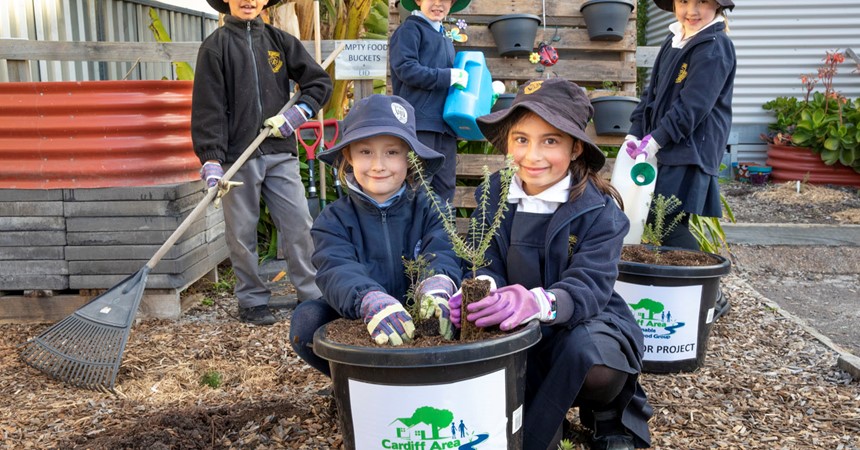In response, the Cardiff Area Sustainable Neighbourhood Group (CASNG), that had formed a Pollinator Project in 2019, ramped up its efforts in asking community members to ‘spare a square.’
The square, they stated, could be in the form of a garden bed, pots, or a vertical garden and would be used to plant flora that would increase habitat for local pollinators.
Using funds secured through the Lake Macquarie Community Environments Grants program, CASNG acquired hundreds of local bird and insect-attracting plants to populate the nominated garden squares.
Since the initiative launched, many residents have taken up the call to spare a square in support of urban pollination, as have community groups.
Among the conscientious green thumbs is St Nicholas OOSH New Lambton, a provider of before and after school care and vacation care operating out of St Therese’s Primary School.
Steph, an educator at the service, said she is excited to be working alongside the children, families, and school community to create an environment that supports pollinators.
“The idea that our service could contribute much-needed habitat, alongside other community members was very exciting,” she said.
“We were able to do this with the help of St Therese’s Primary School, who provided a large space for planting, and CASNG who generously provided our service with over 40 plants.”
In addition to the environmental improvements, Steph explains the Pollinator Project has benefits for children.
She says the project has provided the children attending the OOSH service with an opportunity to further their hands-on learning about the significance of flora and fauna and the active role that they can play in taking small, but essential, steps in caring for nature.
“It is important children are connected with and contribute to their world. We encourage children to respect our environment and the animals with whom they share this space,” she said.
“We are all custodians, regardless of age, and it is never too early or too late to take positive action.
“By sparing a square, our children are learning about the importance of supporting our pollinators.
“Our involvement in the Pollinator Project has been a great forum for the children to ask questions, further their knowledge about pollinators, and of course dig and plant in the earth.”
CASNG’s environmental engineer, Jennifer Maverick, echoes St Nicholas’ enthusiasm for their involvement in the project.
“All of us at CASNG are so happy to partner with St Nicholas OOSH New Lambton. They have shown such great leadership and commitment to our environment.”
To get in touch with CASNG about the Pollinator Project email pollination.org@outlook.com
There are over 20,000 species of bee that exist globally and Australia is home to around 2,000 species of native bee. Native bees have co-evolved with our unique native flora over thousands of years.
Some species of plant can only be pollinated by a particular species of bee. In the absence of pollination, the plant species cannot reproduce so if that bee species dies, so too will the plant.
Bees are important to our livelihood as they help to pollinate most of the crops we eat and many that feed farm
animals. Nearly two-thirds of Australia’s agricultural production benefits from bee pollination.
Without bees, biodiversity is at risk.
Source: Worldbeeday.org.au




























































































